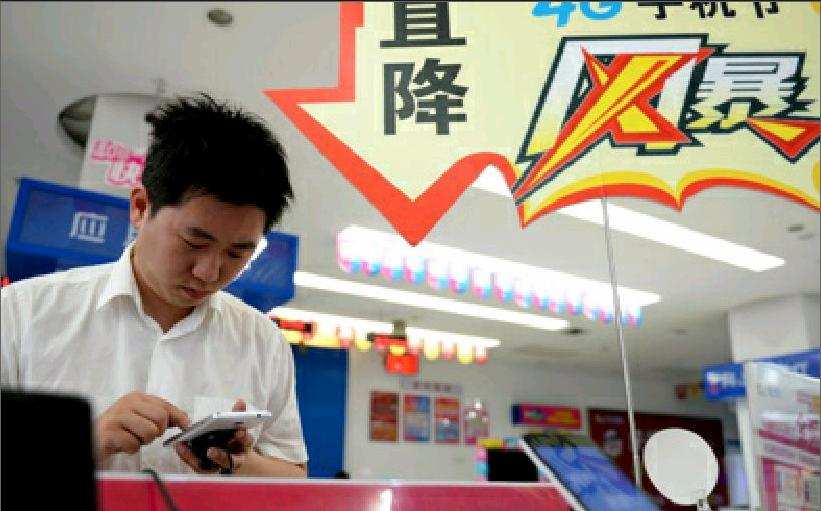Full-Pricing Autonomy
2014-06-17ByLanXinzhen
By+Lan+Xinzhen

On May 17, World Telecommunications Day, Chinas telecom operators launched promotions as usual, but this year, they directly cut their prices. China Unicom offered discounts as high as 90 percent off for data packages, and China Mobile slashed its 4G service prices by 40 percent.
Their moves came in response to a circular released by the Ministry of Industry and Information Technology (MIIT) and the National Development and Reform Commission (NDRC) on May 9, which granted full pricing autonomy to all telecom operators. As of May 10, the two bodies will no longer examine telecom fees, and telecom operators will be able to set their charging model, billing standard and price structure.
Yu Hong, a researcher with the Institute of Industrial Economics of the Chinese Academy of Social Sciences, said this change means market-oriented reform of Chinas telecom industry will advance forward, which will be conducive to building up a freer telecom market with vibrant competition.
Wang Ningyuan, a researcher with Shenzhen-based industrial research company CIConsulting, thinks freeing up all telecom fees represents significant progress in Chinas decision to comprehensively deepen its reform. The telecom industry used to be regarded as a sector involving national security, hence was controlled and “guided” by related government departments. In recent years, however, market access to the telecom industry has been relaxed, with private capital being allowed to enter the industry. However, this policy has achieved little effect. On this occasion, fully freeing up telecom prices indicates the governments firm determination to reduce government intervention.
A press release from the MIIT said granting fully flexible pricing power to telecom operators will be of great significance to further encouraging market competition, allowing full play to the role of the market as an “invisible hand” and increasing the efficiency of the telecom market.
Decided by the market
Chinas telecom market is currently monopolized by three state-owned operators: China Mobile, China Unicom and China Telecom.
Before the recent circular was released, Chinas telecom operators were implementing a billing standard as stipulated by the Regulations on Telecommunications promulgated by the State Council in 2000, which says that prices for basic telecom services should be set or guided by the government, or adjusted by the market and prices for value-added telecom services should be adjusted by the market or guided by the government.
In 2005, the MIIT and NDRC jointly issued a document, stipulating a “ceiling” for local land-line phone charges and mobile roaming charges. For example, charges for mobile roaming calls should not be higher than 0.6 yuan ($0.1) per minute, and those for incom- ing roaming calls should not be higher than 0.4 yuan ($0.06) per minute.
Because of government control, the competition among telecom operators is inadequate. In May 2010, China announced its decision to allow private capital to invest in more sectors, including the telecom industry. In 2011, the NDRC filed for investigation against China Unicom and China Telecom for monopoly. However, the results of private capital entering the telecom industry have been far from satisfactory.
According to Wang, government control over telecom charges is one of the major reasons for the imperfect competition in Chinas telecom market.
Wang said that the MIIT and NDRC will free up all telecom charges and let the market decide prices. This will be a new opportunity for the market-oriented development of Chinas telecom industry.
According to the circular, telecom companies can freely design service packages and prices tailored to consumer demand under the principle of legitimacy, fairness and honesty and offer multiple package options to meet different customer needs. The MIIT and NDRC only require that telecom operators make simple and clear descriptions of service packages, including charges for each service and how subscribers will be charged.
As for the basic telecom services including land-line phones, mobile phones, short messages and broadband services, the MIIT and NDRC only require that telecom companies offer separate options for individual services besides service packages. Their document also encourages telecom companies to provide packages with lower prices to lowincome groups.
Kuang Xianming, Director of the Center for Economic Transition of the China Institute for Reform and Development, wrote in his blog that from this time of market-oriented reform of telecom charges and the recent medicine price reform, it can be seen that China has entered another round of price reform.
Kuang said that at present, product prices in most of Chinas manufacturing industries have been decided by the market, and industrial production is facing challenges owing to market competition. In contrast, prices in many sectors in the service industry are still controlled by the government, such as telecom, education and healthcare. Service price controls block effective trans-mission of service demand to the market and also curb reasonable investment returns in the service sector. The ultimate result is that the shortage of service supplies continues to intensify.
Kuang continued that making service prices more reasonable is the focal point for the market-oriented reform. The reform of telecom prices will be conducive to stimulating competition among telecom operators.
Greater access
China now only has three major telecom operators. Since there are few competitors in the market, even freeing up telecom prices will bring limited real benefits to consumers. Therefore, it would be unrealistic for consumers to expect a dramatic decline in telecom charges.
China has adopted an open attitude to relaxing market access to the telecom industry, and the MIIT has granted virtual telecom licenses to 19 private companies. However, virtual telecom operators have no network resources and infrastructure and have to purchase tele- com services from the three major state-owned operators.
“It is clear that competition in the telecom market will thrive only when the telecom charges are decided by the market, the telecom industry is further opened and the number of operators is increased,” said Wang.
Kuang said that when encouraging and supporting price competition in the telecom industry, the government must also recognize that price reform is only part of the market decision process and far from all of it. Although the prices are freed up, all of the three major telecom operators are state-owned, and it would be easy for them to organize a price-fixing conspiracy. Should that situation occur, telecom prices might go up even if they are freed up.
To prevent such “pseudo competition”, the key is to introduce more competitors and effectively break through the threshold for private capital to enter the market, said Kuang. For example, 4G service is an emerging market and could potentially be made fully open to private investors.
Wen Zongyu, Director of the State- Owned Economy Office of Research Institute for Fiscal Sciences of the Ministry of Finance, said fully opening up the telecom industry is the current trend, and in the future, Chinas telecom market will be an arena where both domestic and foreign companies compete. Negotiations for the Trans-Pacific Partnership Agreement(TPP), Transatlantic Trade and Investment Partnership(TTIP) and the Trade in Service Agreement (TISA) are accelerating. If and when they are signed, telecom companies from the United States and Japan will be able to enter the Chinese market. Therefore the recent market-oriented reform of telecom prices can be regarded as a preparatory measure for future opening up to private and foreign telecom companies.
Wen said that TPP, TTIP and TISA will bring significant changes to Chinas industrial structure, because these agreements require all countries participating in international trade to open up their markets. This means that in the future, China must open all its industries except those involving national security or are related to the lifelines of the national economy, and that stateowned, privately owned and foreign-invested companies will thus compete fairly. It is almost inconceivable that the telecom industry would be listed in either exempt category, hence it will be fully opened up in the future.
“After freeing up the pricing power, we should accelerate opening up the telecom market to all domestic private companies. Otherwise, after U.S. or Japanese companies enter the Chinese market in the future, Chinese companies will be unable to compete with them,” said Wen.
